As the title suggests, this blog post will be about HBO’s Game of Thrones. If you’re not up on the latest season (as of this writing) then I guarantee there will be spoilers.

Obara: Let me tell you what’s going to happen to you, cousin.
Trystane: NO! DON’T TELL ME ANY SPOILERS!
Game of Thrones has never been known as a show where anyone is safe. Great or small, known or unknown, if an actor is on Game of Thrones, they might not be for long.
Rarely do they die of natural causes.

I died of natural causes! I NAILED IT! You don’t get as old as I did by dying off unnaturally, I’ll tell you that.
When someone kicks it, often it is by someone they know, and it is not unusual for their killer to be someone with whom they’ve had some kind of relation or bond. The scheming wife killing her husband. The scheming husband killing his wife. Soldiers who once fought side by side but are now in conflict. Most often it is by someone they’ve pissed off, naturally.
But occasionally, it’s a relationship defined by blood. (As in family and kinship, not that they killed them to drink their blood or something. Littlefinger’s totally a vampire, by the way. Just saying.) We had a few rare examples of that on the show, but Season Six seemed to crank up the kinslaying by quite a lot, so I thought I’d examine these examples of kinslaying, and the kind of fluctuating ramifications.
Kinslaying: Probably not a good idea.
“Old gods or new, it makes no matter,” Lord Rickard told her son, “no man is so accursed as the kinslayer.”
In Westeros, the people with whom you should be able to rely on are your family. Because presumably they’re relying on you. And because it seems like everyone else is out to get you and your family. It just makes sense that if you have to trust anyone, you trust family first.
That depends on the family, or course. And if your sibling has something to gain by your demise. But even if they do have something to gain from your death, it’s hoped that the consequences of kinslaying will stay their hand. If not from conventional secular justice, but from divine providence perhaps. Killing one’s blood-relative is considered a sufficient requirement for being cursed.
Because we’ve had six years of Game of Thrones, and there are roughly two billion characters, all on a spectrum of varying family dynamics, we have a reasonable dataset to see how kinslaying is handled in the story.
I’ll have the actual acts of kinslaying listed in bold emphasis, but I’ll also list off unsuccessful attempts at kinslaying (or other references) unemphasized.
Season One
The first season was relatively light on successful kinslaying, although there were threats and close calls.
- Samwell Tarly chose to join the Night’s Watch rather than have his father Randyll become accursed as a kinslayer. (One way to look at it.)
- Viserys came *that* close to killing his sister as well as his unborn nephew, Rhaego.
- Either Sandor or Gregor Clegane could have become kinslayers as they battled on the jousting field, until King Robert ended their impromptu melee.
(If I’ve forgotten any more examples, let me know.)
Season Two
Things ratcheted up in the second season.
- Stannis Baratheon, in the form of a shadow, killed his brother Renly.
- Jaime Lannister killed his trusting cousin Alton, in order to make an escape attempt from Robb Stark.

Jaime: I have an idea, and it’s as hot as my sister.
Alton: Seven Hells! That is hot! She’s like wildfire hot! Like SMOKING HOT!
Jaime: I am SO going to strangle you now, thank you.
- Tyrion was nearly assassinated on orders from either his sister Cersei or his nephew Joffrey. (I think Joffrey is innocent.)
- Craster is guilty of many things, and if the Others weren’t collecting his children as recruits he’d also be guilty of infanticide.
Both Jaime and Stannis killed their kinsmen as a means to an end, but the advantage they gained was short lived. Jaime was immediately recaptured and the collateral damage of a dead Karstark put Jaime in a very dangerous situation. Stannis took control of a large part of Renly’s men upon his younger brother’s death, but that army sailed up the Blackwater and into green, fiery doom. There was not much return on either of the kinslaying actions.
Season Three
- Robb Stark beheaded his distant relation, Lord Rickard Karstark.
Wait, I hear you say, does that even count?
Well, I get that. At some point, everyone in the North (or at least the nobility) is probably related to nearly everyone else, in a six degrees (or less) of separation way.
Just where is the line when it comes to “not related enough” to not be kinslaying? I don’t have an answer, and I’m reserving more Karstark-Stark thoughts for another post, but Lord Rickard Karstark before he died asserted that he and Robb Stark had enough proto-Stark blood in common that his execution at Robb’s hand would be kinslaying, and Robb would be accursed. So I’m counting it as a legit example.
- Stannis would have burned alive his nephew Gendry, but Davos Seaworth saved King Robert’s bastard son and set the lad free.
Season Four
- Tyrion is accused of killing his nephew, Joffrey. (He didn’t. Don’t believe Braavosi theatrical propaganda.)
- Jaime danced around bringing up the topic killing Alton when he and Tyrion were discussing all the fancy terms for specific types of homicides.
- Lysa almost becomes a kinslayer, but her attempt to toss Sansa out of the Moon Door was cut short by her own unscheduled trip.
- Tyrion earns the title of patricide, when he kills his father, Tywin.
Season Five
- Stannis Baratheon burns his darling daughter, Shireen. Stannis!
- Cersei puts out rewards for Tyrion’s death. Okay, it wouldn’t be her directly killing her brother, but close enough for purposes of noting it here.
Season Six
Up until the sixth season, Game of Thrones was averaging about one legit kinslaying act a season. Five seasons, five relations killed by blood. (Give me this when it comes to Robb and Rickard Karstark.) Lets check the Season Six stats.
- Obara Sand kills her cousin Trystane.
- Ramsay Bolton kills his father Roose.
- Ramsay eliminates Roose’s true born infant son (Ramsay’s unnamed half-brother.)
- Jaime admits to killing his cousin in front of the High Sparrow. (He was probably about to murder the High Sparrow and thus eliminate the only witness to his confession, but a squad of Faith Militant appeared and he reconsidered.)
- Euron Greyjoy kills his brother, King Balon Greyjoy.
- Euron confesses to fratricide at the Ironborn Islands Convention (the kingsmoot) but the delegates are all “that’s cool, bro.”
- King Euron announced plans to murder his niblings, Theon and Yara.
- Cersei’s destruction of the Great Sept kills her cousin, Lancel.
- Cersei’s Wildfire plot also eliminates her uncle Kevan.
So Season Six had more acts of kinslaying than all the previous seasons combined!
But why so many? Some of that had to be due to timing. The death of Balon Greyjoy takes place much earlier in the books, but to kind of sync up the back end of Yara and Theon’s journey to coincide as allies to Daenerys coming to Westeros, killing Balon later makes structural sense. (I will eventually air some complaints though.)
The brief rise of Ramsay sets the stage for his defeat by the Starks. I feel that Roose would have been more clever about dealing with Jon Snow’s army, or that had Roose been active in the season, Ramsay’s death would seem less important. So again, killing off Roose makes sense for the story.
Cersei being backed into a corner, with her uncle and cousin opposing her does set them up as collateral damage when she takes out her primary target, the High Sparrow. Of course, all of her political enemies being in one place, like Dany’s immolation of all the great khals, was necessary for her to clear the way to her power grab.
Syncing Jon’s declaration of King in the North with Cersei’s coronation was a nice moment, so the kinslaying throughout the season led to a good place narratively. It’s just unusual to see so much of it all at once.
Kinslaying Consequences?
I could try to make a case that someone who kills their kin on the show is indeed accursed. I mean, we have lots of examples of bad things happening.
- Jaime loses his hand. Then loses all of his children.
- Stannis kills his brother, and loses. Sacrifices his daughter, and loses. Loses his wife, and his life. Stannis, you big loser.
- Ramsay Bolton, dead.
- Cersei is on top, but let’s face it, she’s teetering on the edge of a downward arc, with nowhere to go but down. Her coup indirectly led to losing her last remaining child (and is definitely going to be a bee in the bonnet of her relationship with Jaime.)
But in some ways, I’m more interested in the examples where the kinslaying doesn’t seem to have a downside (yet.) And in some cases, are strangely contrary to the books.
Outstanding Lannister Debts
Tyrion killed his father, but being a Lannister-killer actually scored him some points with Daenerys Targaryen, who has a legitimate axe to grind with the Lannisters.
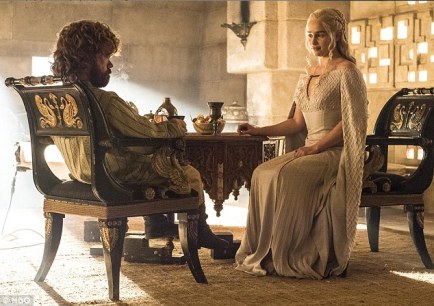
Dany: So you’re a treacherous kinslayer?
Tyrion: I can hardly be blamed for killing my mother, and Tywin Lannister told me before he died that I was no son of his. So that’s still a question, isn’t it?
I shouldn’t ignore the fact that when last asked about Tyrion, Jaime implied that he would seek vengeance for the death of their father.
It’s Dorne. They’re All Crazy There
Prince Doran’s death was a surprise to me, as well as Prince Trystane’s at the beginning of the season.
For the record, Ellaria killing Prince Doran was not an act of kinslaying, since there was no blood relationship between them. (That I know of. I mean, even Rhaegar Targaryen and Robert Baratheon were related if we go back three generations or whatever.) But Obara killing her cousin definitely qualifies.
For some reason, it seems that the Dornish are totally cool with this. I’d expect that other noble families, even if they weren’t all that keen on the Lannisters, would balk at the Sand Snakes, led by Ellaria Sand, taking over supreme executive power. There are powerful families in Dorne (like the Daynes.)
Although to be fair, we don’t know if the Sands actually admitted to the coup, they could have blamed the death of Doran and Trystane on the Lannisters. (It’s unlikely though, but humor me a moment.)
When the assassination took place, Prince Doran was killed as well as his bodyguard, the (allegedly) formidable Areo Hotah, and also the maester who had brought the scroll from Jaime Lannister alerting the prince that Myrcella had been poisoned by Ellaria.
Killing the maester kind of implies that Ellaria was trying to keep the circumstances of Doran’s death secret. (We assume that she could count on the loyalty of the guards, who were totally on Ellaria’s side in the Doran-takedown.)
It makes sense if Ellaria wanted Dorne to rise up against the Lannister-run crown to paint the death of the Martells as a Lannister plot. After all, Trystane is killed on the ship anchored just offshore from the Red Keep. (People argue about this. Stop arguing. Trystane was painting Myrcella’s funeral eyeball rocks. He was clearly still anchored there.)
But Jaime mentions mid-season that Dorne had to be dealt with, since the Sand Snakes had not only killed Myrcella but had killed off the war-averse Martells. Maybe this was just his deduction. That wouldn’t be a weird call for Jaime to make.
Maester: A raven has come from Dorne. The Sands claim Prince Doran was killed by the Lannisters!
Jaime: Sounds reasonable. Cersei, did you have Prince Doran killed? No, don’t answer, that’s silly. Whenever you’ve tried to kill anyone, they’re guaranteed to survive unless they’re fools.
Cersei: *fumes*
Jaime: I bet Ellaria killed Doran. She’s awesome at killing people.
At the end of the season, Lady Olenna was meeting with the Sand Snakes, and she brought up how they rose to power in a treacherous manner. *Maybe* she had verified the deduction from Jaime. And when she asserted that Obara had killed her cousin *maybe* it was another deduction that no one was needing to refute.
But as much as I would like the show to have some subtlety, and have Ellaria try to blame the logical enemies, it just seems like it’s common knowledge, unambiguosly declared knowledge, that Team Ellaria wiped out Team Martell, which is shady at best and involves kinslaying in regards to Prince Trystane.
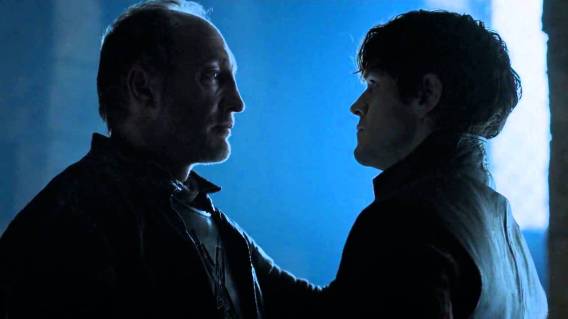
Ramsay: Dad, if you had killed granddad, would you have told people about it, or made up some lie?
Roose: Your grandfather was poisoned by our ambiguous and ill-defined enemies. Anything you’ve heard to the contrary is mere idle speculation of people just waiting to be flayed.
Even Ramsay Bolton knew that it was wiser to pretend that his father Roose had been poisoned by their enemies, because the truth of his treachery would undermine his standing among the houses that were currently leaning towards the Boltons as the power in the North, whether they liked it or not.
So, I’m just scratching my head about Dorne.
No Kinslayer May Sit the Sea-Stone Chair. But We’ll Make an Exception for You, Euron
It’s even a bit more odd in the Iron Islands. The culture of the Ironborn in some ways is the most religiously-influenced, although the show de-emphasizes that. In the books, a kinslayer is not something an Ironman wants to be known as. (The Victarion point-of-view chapters in the later books make that pretty clear.)
The show presents Euron as winning over the Ironborn by admitting that he killed Balon and by apologizing for not killing Balon earlier and sparing them all the defeats they suffered as part of Balon’s northern invasion plan. I guess that all works consistently, if we imagine the Ironborn as secular opportunists and not as a people following a rigid superstitious code that would have branded Euron an outlaw and clearly disqualified him as king.
In general, even among the treacherous and surly, admitting to kinslaying seems like a bad plan. It’s best to have the dead leader forgotten and move on. But if they’re killed by treachery, *especially* by their blood relatives, there’s this sense that the only way they could have been killed was by treachery. That they were unusually strong.
And with the kinslayer in charge, any time anything is difficult, or there are unexpected obstacles, it’s easy to have that interpreted by followers with shaky loyalty that the problems are the will of divine forces, angry at the kinslayer.
Thoughts?
I don’t know if this post had an overriding point, other than to illuminate the sudden increased use of kinslaying, and how it’s a taboo subject at times, or considered a tactical advantage in other times. But we have a long time until the next season, and I’d be happy to discuss the topic further. Let me know in the comments.
Has the show estabished penalties, secular or divine, for kinslaying? There’s so much death and bad things happening to everyone, it might be as Ser Davos told to Stannis when word of the Red Wedding came in. Sometimes men die in war.
Of course, if it is divine punishment, we can argue just what is the divine force at work. Since there are many competing candidate religions.
But I think it’s a reasonable rule of thumb: be ruthless with your enemies, but don’t make enemies of your family.
(Comments are always welcome. Super welcome! But if you want to talk spoilery Game of Thrones talk with me (also welcome) I’d invite you to visit my Safe Spoilers page on my backup blog. That way my non-book-reading friends won’t be shocked with foreknowledge.)
Images from HBO’s Game of Thrones (obviously.)
I make no claims to the artwork, but some claims to the text. (“I love the smell of Wildfire in the morning…” is clearly a riff on the famous Robert Duvall napalm assertion from Apocalypse Now.)
If you liked this article, thank you! I have all of my Game of Thrones related articles on my handy-dandy Game of Thrones page should you want to read more but don’t want to navigate around my site.
© Patrick Sponaugle 2016 Some Rights Reserved
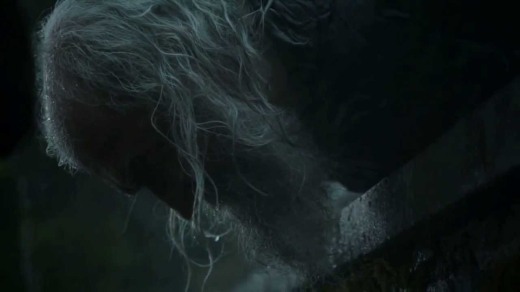
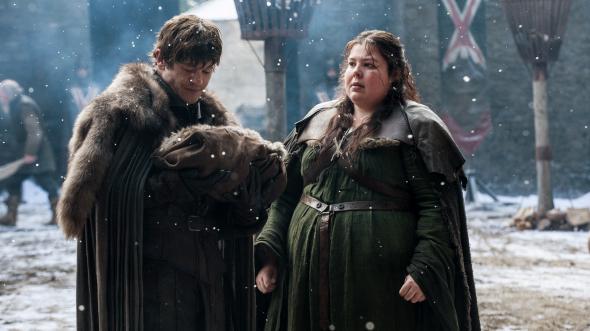
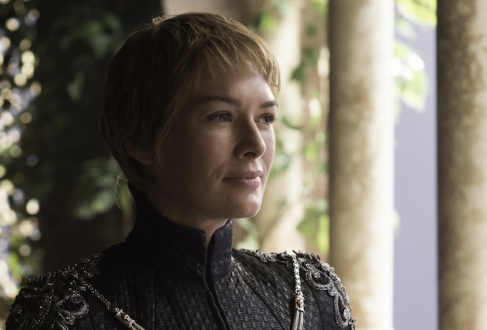
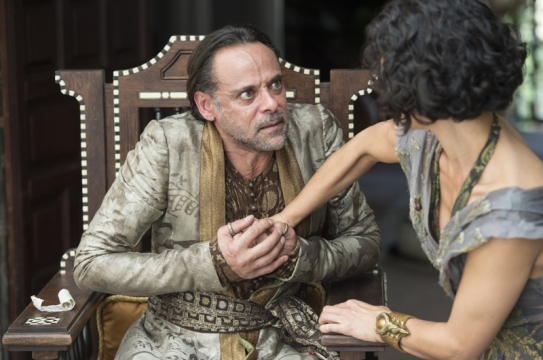
Not sure why “kinslaying” is limited to blood only, vs including family by marriage. Seems equally offensive, but “blood” is a powerful talisman in these times. (And if family by marriage was included, you could list Lysa Arryn for example).
Also, with regard to the Trystane murder, I don’t argue about that one, but I definitely found that whole narrative poorly shot and edited (and maybe scripted?), and lacking in geographic and chronological clarity.
Good post, Pat!
LikeLiked by 1 person
Definitely, there’s potential for a post about people with close familial ties not defined by blood. I just don’t think of marriage and in-law relationships as equating to kinship per se the way biology does.
If we do expand it out, then Littlefinger, Lysa, and Olenna make the list.
LikeLike
*reads all the points, can’t respond to all the points, sweats*
Here’s one thing I have – Theon killing Bran and Rickon. No, he was not a brother to them by blood, but he states in season 3(ish?) that his father ‘died at King’s Landing.’ I think that counts as kinslaying. Everyone else saw him as a dirty dirty traitor, even the Ironborn were kind of like ‘Nah, brah. Nah.’
And Tyrion – you could go long with a ‘that was justice for the Red Wedding’ justification for his kinslaying. I wonder if it counts if the kin you’re slaying has slain someone else’s kin? I guess that gets into the whole ‘eye for eye = whole world blind’ conundrum, and violence is a disease and such.
“Anything you’ve heard to the contrary is mere idle speculation of people just waiting to be flayed.”
BWAH HA HA!!! (But also sobs, I will miss that glorious voice and his sick burns on Ramsay. RIP Roose!)
LikeLiked by 1 person
You big silly! Theon didn’t kill Bran and Rickon! Just some random kids.
But if he had, we’d have to consider if it’s kinslaying since he was a foster brother (by force.)
That’s a good test case, and certainly falls into the same level of dangerous treachery as kinslaying.
I’m so glad you liked my Roose Bolton dialog. (I miss him too!)
LikeLiked by 1 person
Er– you know what I mean. Yes, fostered by force!
I do. I saw that actor in something else (The Hollow, I think?) and he was good, but it just wasn’t the same. And the dude who played Benjen was in it too!
LikeLiked by 1 person
There does seem to be a few inconsistencies regarding payback for kinslaying (I guess a little like the ‘dead always come back changed’ scenario) But I certainly hope Tyrion avoids the karma fallout or that it’s at least minor. His act of violence was very justified I feel.
On a completely unrelated note: niblings. Love that word! I didn’t actually know it was a word but apparently some kids from Somerset campaigned to get it in the Oxford English Dictionary a few years back. I’m definitely using it from now on. Pointless piece of info, I know!
LikeLiked by 1 person
I love the word “nibling” – I don’t need to use it, since I only have nieces, I don’t have any nephews. But I try to use nibling whenever I can.
🙂
LikeLiked by 1 person
Euron confesses to fratricide at the Ironborn Islands Convention (the kingsmoot) but the delegates are all “that’s cool, bro.” — hahahaha this was too funny for me
LikeLiked by 1 person
🙂 I’m happy to hear this. My goal is to bring a little bit of humor along with these analyses. Thank you for reading and commenting!
LikeLiked by 1 person
Of course! I just keep on reading, sometimes I forget to comment but your site has been one of my go-tos (even during work) hahaha! Thanks Pat!
LikeLiked by 1 person
Thank you so much, 🙂
LikeLiked by 1 person
You forgot Meera killing JoJen… if you are going to count distant relations like Carstarks then you have to give it to Meera who didn’t want her brother to die at the hands of the wights.
LikeLiked by 1 person
You are right. I assume Meera would be given a pass, since she just helped speed Jojen on his way after being gutted, but I think Meera the Kinslayer is a legit title.
LikeLiked by 1 person
She did it for the REALM!
LikeLike
There is righteous kinslaying and non-righteous kinslaying. Tyrion on Tywin = kind of righteous, although that’because we love Tyrion and hated Tywin. Khal Drogo gilding his brother-in-law? Overdue. The rest, not so much. But let’s face it, the shock value is second to none. Kinslaying has a lot of impact – everyone freaked out at the Red Wedding (except those of us who read the books, we just watched everyone else’s expressions when it all went down) and then when Arya served Walder Frey that finger pie, we simultaneously cringed and cheered. Big impact! Also, these people are all related and competing with each other so of course they kill each other, related or no. It’s like Survivor. They cooperate while it’s useful, then turn on each other. (It’s kind of the whole point, no?) Do we really think that the sibling units left have some kind of unshakeable solidarity? Can we not see Jaime and Cersei turning on each other? Did you see the look on Jaime’s face at Cersei’s coronation? The Sand Snakes have already demonstrated a lack of internal unity. What about Jon and Sansa? Jon and Bran? Theon and Yara? This series is very much a “last man standing” type of story, so I think we’ll be seeing more attrition over the next two seasons, and pretty much every significant character left is related to another significant character. Who isn’t? Danaerys, ok. Littlefinger? He’s not going to make it through the primaries, much less get the nomination. Brace for more kinslaying, methinks.
Great post, Pat! Perfect beach reading.
LikeLiked by 1 person
Sorry, didn’t do a final edit before posting this comment – meant to say, Tyrion’s patricide is acceptable to us because of who the individuals are, it’s a value judgement on our part. We were meanly glad that Tywin got an arrow while sitting on the pot. It’s too bad it was Tyrion who had to do it but he had the most reason.
LikeLiked by 1 person
No problem, I also wanted to comment that we’ll probably see more attrition like you say, initiated by unreliable allies.
I hope Littlefinger doesn’t make it past the primaries. 🙂
Thanks again for the comments!
LikeLike
A great comment to an allegedly great post!
Glad you enjoyed it, and I hope you are enjoying the beach. It’s always great when you check in, Lea.
I agree that kinslaying usually is a shocking move, but not a surprising one, really. There’s usually a good reason for it, so it all makes sense, like we knew it was going to happen subconsciously.
LikeLike
Wow, there really is a lot of kinslaying going on. I knew that, but didn’t realize the extent until you lined it all up like that.
I believe there will be more.
Aaaaaaand… Stannis needs to burn in the Seven Hells for eternity for what he did.
LikeLiked by 1 person
Yeah. Stannis. Yeah. I am not going to argue in his defense. When Davos eventually dies, I suspect he’ll petition to be able to visit Stannis and kick his ass.
I’m glad you found the post informative! Thanks for the comment.
LikeLike
I often thought about matricide…but then I have dyed my hair Cersei blonde so anything is possible. Great post Patrick!
LikeLiked by 1 person
Thank you, your grace! I’m pleased that you liked my post. And your tendencies lend towards matricide and not PATricide.
Hope you and your man are doing well!
LikeLiked by 1 person
Well, both Ma and Pa are departed from this earth but I promise I had nothing to do with it – I just thought about it! Teddy and Bunny are fine. Bunny is going on a solo trip to Salt Lake City and may come back Mormon or just sun-tanned. Depends on my mood… 😉
LikeLiked by 1 person
🙂
LikeLiked by 1 person
Since they’re moving away from (or at least past) the books, I hope they keep this spirit alive: the spirit of “kinslaying tends to end poorly.” It never quite feels like a direct line, even like Stannis’ shadow kills and kings blood sacrifices (like Balon’s death) leave us wondering what happened. Which is a good place to be when you’re writing Divine Retribution events. I just hope the show keeps track of the kinslayers in the coming seasons. Because we know GRRM will be!
Death by author!
LikeLiked by 1 person
Yeah, I’ll be keeping my eye on those rogue kin-slayers! Karma should be dropping on them. Thanks for the feedback (and for tweeting the post!)
LikeLiked by 1 person
Great post Patrick!
About Euron and the Ironborn endorsement: Although kinslaying is a big no no, it did seem as though they’d rather have a kinslayer than a woman on the Salt Throne. Yara wasn’t a viable candidate and it’s highly likely the rest mocked Theon for his loss of manhood and recent actions. Yara is a favourite of mine, but even she protested at Daenerys’ insistence that reaving and raping has to stop. Which says a lot about Ironborn society.
I also think it may have to do with crowd mentality when someone walks in and takes charge. Ser Alliser, for example, and the murder of Jon Snow. Many of the Night’s Watch cried traitor but when he justified his actions they all shut up. He managed, for the most part, to convince the crowd. The rest backed down.
Cersei’s coronation, another prime example – although t’s unheard of to have a woman on the Iron Throne and she blew up half the aristocracy of King’s Landing, the rest were present and correct, and seemingly unquestioning. Of course the fall out remains to be seen.
LikeLiked by 1 person
I’m planning on another blog post about the Ironborn… I’ll probably include some of your input here (and give you credit and a shout out and a link to your blog and so on…)
Hi! Nice to hear from you again, Joanna! Hope you’re doing well
LikeLiked by 1 person
I’ll definitely read that post 🙂 I’m fine more or less. In a bit of a blog writing slump I’m afraid – my mood is not the best. But my little grey cells are whirring as usual, and there’re so many busying themselves with GOT 🙂
LikeLiked by 1 person